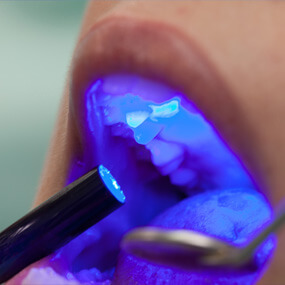The Role of Nutrition in Oral Health

You are what you eat is a proverbial expression that reflects how important diet is to your health. A well-balanced diet can give you energy and help stave off disease, and there are many health issues that are either caused or exacerbated by various foods and beverages. Nutrition also plays an integral role in oral health, and eating well can make it much easier to enjoy healthy teeth throughout your life.
Emphasize Vegetables and Fruits
Fresh fruits and vegetables are among the most effective ways to balance a diet and can be used as a snack without undermining that diet. These food items are loaded with vitamins, minerals, and other nutrients. Fruits do contain natural sugars, but water and fiber help to balance that out, which is why fresh fruit is considered good for you while many fruit juices are not. In terms of oral health, crunchy fruits and vegetables have value beyond their nutrients. Chewing them promotes saliva production, which wets the mouth and washes acids away, and chewing also provides healthy stimulation for the jaw and teeth.
Be mindful that not all fruits and vegetables are created equal when it comes to nutritional value. Perhaps the easiest way to ensure proper nutrition is to pick out a colorful variety of vegetables and fruits. Dark, leafy greens are always an excellent choice for oral health since they contain calcium, which strengthens tooth enamel, and vitamin C, which reduces inflammation and thus help resist gum disease. Good ways to work in more greens include adding them to sandwiches, soups, and smoothies.
Citrus fruits have a great deal of vitamin C and calcium as well. However, citrus fruits should be eaten in moderation. Not only do they pack in a great deal of natural sugar, but they are loaded with acids that attack your tooth enamel. When you do eat highly acidic foods like citrus fruits, aim to balance them out with alkaline foods, such as cheese, nuts, legumes, other vegetables, and non-citrus fruits.
Other foods that are particularly good for oral health include broccoli, butternut squash, onions, peppers, shiitake mushrooms, and sweet potatoes. Shiitake mushrooms are not only loaded with nutrients but contain an antibacterial agent that helps to control bacteria in the mouth and slows plaque accumulation. You can eat shiitake mushrooms raw, but they retain those qualities cooked as well.
Limit Your Sugar Intake
Sugar is not the only cause of oral health issues but is a leading cause. There will certainly be natural sugars in the foods you eat, and your body absolutely needs them to create energy. However, it will get those sugars from all of the foods you eat. You never have to supplement your diet with a sugary food. You should also avoid foods and beverages that are empty calories. Drinking soda regularly can be devastating for your teeth, and diet sodas are not any better due to all the acids they contain.
Snacking is where many people get themselves into trouble when it comes to sugars, starches, and acids. If you know you will need a snack, prepare a baggie of veggies, fruits, cheese, nuts, or a mix. Avoid candies and, in particular sticky candies, which can get stuck in your teeth and assault them for hours. When you do treat yourself, it is better to do so with a dessert as part of a larger meal due to the additional saliva production. Sugar-free gum is an excellent option after meals and snacks for saliva production, and if you choose gum with xylitol, it actually helps to prevent cavities.
Keep Yourself Hydrated
Research indicates that most people do not drink enough water, although this is improving due to increased awareness. How much should you drink? It depends. The 8-by-8 rule—eight 8-ounce glasses a day—is outdated advice and not appropriate for everyone. You are much better off having a spill-proof water container with you at all times so that you can sip whenever you feel thirsty or have eaten something. Water should be your main drink. Limit coffees, teas, juices, and soft drinks as much as possible, and if you need a bit of flavor, consider adding a drop of a nonacidic essential oil to your water.
Hydration plays an important role in oral health as regular water drinking washes away bacteria and food particles while promoting saliva production. Water also dilutes acids from food and beverages that can otherwise weaken your tooth enamel and make it more prone to cavities. For the most purified and best-tasting water possible, you may want to consider drinking water that has been filtered through a reverse osmosis system. Reverse osmosis filtration extracts most impurities found in water, including chlorine, fluoride, lead, arsenic, mercury, and other heavy metals.
Do Not Overlook Dairy and Protein
Lean proteins are excellent options for your teeth as well since they are rich in phosphorous. When it comes to meat, white fish and skinless white-meat poultry are the best options, but you can also opt for lean red meats. Eggs and milk are also good choices. In addition to milk, many dairy products are rich in calcium, such as cheese, cottage cheese, and yogurt. These foods also contain proteins that neutralize acids in the mouth, which makes them an excellent pairing with the acidic healthy foods you enjoy. Beans, nuts, and seeds are not only good proteins but provide your body fiber and vital minerals.
Dental Health and Quality of Life
There is a link between oral health and systemic health, and a well-balanced diet is essential to longevity and a high quality of life. Dental problems undermine that quality by causing pain, undermining your self-confidence, and making it more difficult to enjoy the foods you love. A well-balanced diet, good oral hygiene, and regular checkups with your dentist are a winning combination that helps avoid those issues.
Balance Your Diet for Better Oral Health
When balancing your diet, ensure that the nutrients required for good oral health are well-represented. It is also imperative that you practice good oral hygiene and visit your dentist twice a year to have your teeth cleaned and examined. Your regular checkup is also an excellent opportunity to talk to Jeffrey D. Clark, DDS, about your nutrition within the context of your oral health. Call us at 480 585 1853 to schedule your next checkup at Scottsdale Cosmetic Dentistry Excellence.




